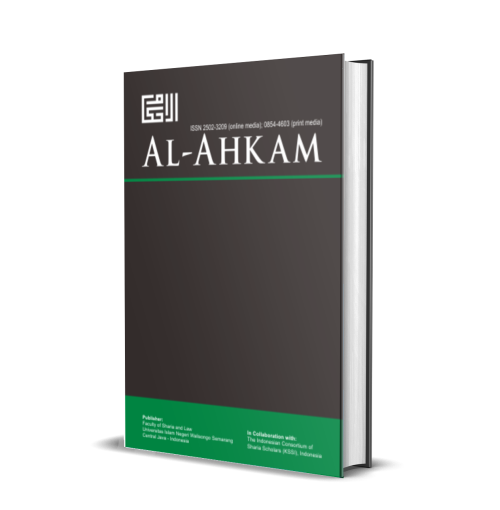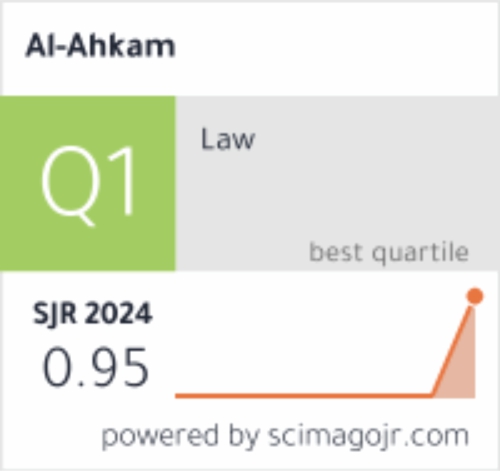HOW TO MAKE ISLAMIC LAW AS THE STATE LEGAL POLICY OF INDONESIA: Constitutional and Sociological Arguments
DOI:
https://doi.org/10.21580/ahkam.2017.27.2.1918Keywords:
Islamic law, living norms, UUD 45, equal rightAbstract
This article aims to answer some questions: what is the meaning of “equal right” and “religious freedom” written in the text of UUD 45? How if, in the name of religious freedom, other people’s rights are offended? how if, in implementing Islamic law, others people’s rights are offended? Indonesian Constitution (UUD 45) gives freedom to every follower of a given religion to concretize his religious convictions in public life provided that, in doing so, the fundamental right of others are not offended. The UUD 45 also gives freedom to every citizen to make his religious convictions or religious teachings become a state legal policy as long as he or she follows the procedural constitution written in the UUD 45. However, after becoming state legal policy, Islamic law can no longer be claimed “Islamic Law”, because it’s now provided for answering the partial question of life, namely how to administer the state. From a sociological point of view, in order that the process of legislation runs smoothly, Islamic Law should first be transformed into living norms. Hence, it will be easier for the society to abide the law which originated from living norms. Since the function of law in maintaining public peace and order depends, for its effectiveness, on the actual social norms of the community, social acceptance is of great importance. Two ways of resolution will be discussed in this article, these are democratic resolution and transforming Islamic Law into social norms.
[]
Artikel ini bertujuan untuk menjawab beberapa pertanyaan, apa arti "hak yang sama" dan "kebebasan beragama" yang tertulis dalam teks UUD 45? Bagaimana jika atas nama kebebasan beragama bersinggungan dengan hak orang lain? Bagaimana pula jika dalam menerapkan hukum Islam mengganggu ataupun mengabaikan hak orang lain? UUD 1945 memberikan kebebasan kepada setiap penganut agama untuk mengekspresikan keyakinan agamanya dalam kehidupan publik dengan cacatan tidak mengganggu dan mengabaikan hak orang lain. UUD 1945 juga memberikan kebebasan kepada setiap warga negara untuk membuat keyakinan agama atau ajaran agamanya menjadi kebijakan hukum negara selama tetap mengikuti prosedur yang tertulis dalam UUD 1945. Namun, setelah menjadi kebijakan hukum negara, hukum Islam tidak dapat lagi diklaim sebagai "Hukum Islam", karena hukum tersebut telah dibuat dalam rangka memberikan solusi terhadap berbagai macam permasalahan dalam kehidupan, lebih tepatnya hukum tersebut telah menjadi pengatur sebuah Negara. Dari sudut pandang sosiologis, agar proses perundang-undangan berjalan lancar, Hukum Islam pertama-tama harus diubah menjadi norma hidup sehingga akan lebih mudah bagi masyarakat untuk mematuhi hukum yang berawal dari norma hidup. Karenanya hukum berfungsi dalam menjaga ketertiban publik, dan ini bergantung pada norma sosial yang berlaku pada masyarakat, sehingga akan mudah diterima oleh masyarakat. Dua tawaran solusi akan dibahas dalam artikel ini, yaitu: resolusi demokratis dan mengubah Hukum Islam menjadi norma sosial.
Downloads
References
Arief, Barda Nawawi, Bunga Rampai Kebijakan Hukum Pidana, Bandung: PT. Citra Aditya, 1996.
Attabani, G. Salahuddin, “Islamic Shari’a and The Status of Non-Muslim”, in Tarek Mitri, (ed.) Religion, Law and Society, Geneva: World Council of Churches, 1995.
Audi, Robert, and Wolterstorff, Nicholas, Religion in The Public Square, The Place of The Religious Conviction in Political Debate, Boulder: Rowman & Little Filed Publisher Inc, 1997.
Aziz, Munawar, “The Concept of Civilization on Islam Nusantara”, Jurnal Lektur Keagamaan, Vol. 13, No. 2, 2015.
Bassiouni, M. Cherif, (ed.), The Islamic Criminal Justice System, New York: Oceana Publications, Inc., 1982.
Devlin, Patrick, The Enforcement of Morals, New York: Oxford University Press, 1977.
Gamwell, Franklin I, The Meaning of Religious Freedom, Modern Politic and The Democratic Resolution, Albany: State University of New York Press, 1995.
Greenawalt, Kent, Religious Conviction and Political Choice, New York: Oxford University Press, 1988.
Hart, H.L.A., Law, Liberty, and Morality, Oxford: Oxford University Press, 1963.
Hasan, Nor, “Agama dan Kekuasaan Politik Negara”, Jurnal Karsa, Vol 22, No. 2, Desember 2014.
Hefner, Robert M. and Horvatich, Patricia, Islam di Era Negara Bangsa (Islam in The Era of Nation State), (trans. Imron Rosyidi), Yogyakarta: Tiara Wacana, 2001.
Hoesein, Zaenal Arifin, “Pembentukan Hukum dalam Perspektif Pembaruan Hukum”, Jurnal Recht Vinding, Vol 1, No. 3, Desember 2012
Kamenka, Eugene, “Community, and The Socialist Ideal”, in Eugene Kamenka, (ed.), The Community as a Social Ideals, London: Edward Arnold Ltd. 1982.
Koshy, Ninan, Religious Freedom in a Changing World, Geneva: World Council of Churches Publication, 1992.
Lee, Keekok, The Positive Science of Law, Hampshire, England: Gower Publishing Group, 1989.
Lyons, David, Ethic and The Rule of Law, Cambridge: Cambridge University Press, 1993.
Peczenik, Aleksander, On Law and Reason, Dordrecht: Springer Science and Business Media, 1989.
Rahardjo, Satjipto, Ilmu Hukum, Bandung: PT Citra Aditya Bakti, 1996.
________, Pemanfaatan Ilmu-ilmu Sosial bagi Pengembangan Ilmu Hukum, Bandung: Penerbit Alumni, 1977.
Rauf, Muhammad Abdul, Tan Sri., The Concept of Islamic State; With Particular Reference to Treatment of Non-Muslim Citizens, Malaysia: Islamic Affairs Division Prime Minister’s Departement, 1998.
Rawls, John, Political Liberalism, New York: Columbia University Press, 1993.
________, Theory of Justice, Cambridge: Harvard University Press, 1971.
________, Justice as Fairness, A Restatement, Cambridge: Harvard University Press, 2001.
Rosen, Lawrence, The Justice of Islam, Comparative Perspective on Islamic Law and Society, New York: Oxford University Press, 2000.
Unger, Roberto Mangabeira, Law in Modern Society, Toward a Criticism of Social Theory, London: The Free Press (MacMillan Publishing Co.), 1976.
________, The Critical Legal Studies, London: The Free Press (MacMillan Publishing Co.), 1983.
Zahra, Muhammad Abu, Uṣūl al-Fiqh, Cairo: Dār al-Fikr al-Arabi, n.d.
Downloads
Published
How to Cite
Issue
Section
License
By submitting an article to the journal, the author(s) agree to transfer the published article's copyright to the journal, which will act as the publisher. This means the journal will have the right to publish the article in various forms, including reprints. The journal will maintain the publishing rights to the published articles.
In line with the license, authors and third parties (readers, researchers, and others) are allowed to share and adapt the material. In addition, the material must be given appropriate credit, provided with a link to the license, and indicated if changes were made. If authors remix, transform or build upon the material, authors must distribute their contributions under the same license as the original.




